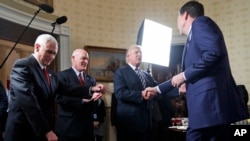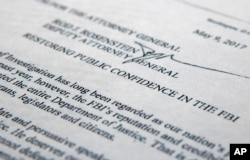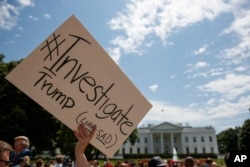A report in a major U.S. newspaper late Thursday said President Donald Trump summoned Federal Bureau of Investigation Director James Comey to the White House in January where the president asked Comey to "pledge his loyalty to him."
Comey was fired by Trump Tuesday, creating a political firestorm and raising concerns in some circles about a constitutional crisis.
The New York Times said Comey refused to make the pledge, but instead told Trump that he would "always be honest with him." Trump pressed Comey several times for his loyalty, and finally Comey told the president he would have the FBI director's "honest loyalty," according to the newspaper account.
Comey told associates about the dinner and asked them not to tell anyone while he was FBI director, but the associates feel free to talk about details of the dinner now that Comey is no longer at the FBI helm, the Times reported.
In an interview with NBC News Thursday, Trump gave a different account of the dinner. The president said Comey requested the meeting because the FBI director wanted to keep his job. The president did not mention a loyalty pledge request.
In the television interview, the president said he had asked the head of the nation’s prime law enforcement agency whether he was being investigated.
Trump said he asked Comey “if it’s possible, would you let me know, am I under investigation? He said, ‘You are not under investigation.’”
The president, in the television interview, repeated “I am not under investigation” when asked about Comey’s sworn testimony that there is an ongoing probe into his 2016 president campaign and possible collusion with the Russian government.
'Highly inappropriate'
Legal analyst Bradley Moss, who specializes in national security issues, called such an exchange "highly inappropriate" at a minimum.
“There is supposed to be a line that is not crossed, including asking the FBI if you yourself are the target of the investigation,” Moss told VOA.
But Moss, deputy executive director of The James Madison Project, a Washington-based organization that promotes government accountability, added it is “difficult to say if it is actually illegal, since Comey allegedly responded that Trump was not under investigation.”
Laurence Tribe, a Harvard professor specializing in constitutional law, wrote on Twitter it is “now totally clear that Trump’s firing of Comey was an obstruction of justice. That was the first article of impeachment against Nixon.”
That is a reference to former President Richard Nixon, who resigned in 1974 less than a month after the House of Representatives began impeachment proceedings against him.
Trump asserts in Thursday’s interview he would have fired Comey even if top Justice Department officials had not recommended it, calling former President Barack Obama's appointee “a showboat. He's a grandstander.”
Comey was directing investigations into connections between the Trump campaign and Russian officials, along with possible meddling by Moscow in the 2016 U.S. presidential election.
Rosenstein memo
The White House on Thursday continued to defend its dismissal of the FBI chief and denied it tried to put the responsibility on Deputy Attorney General Rod Rosenstein's memo for the abrupt removal.
“I don’t think there was ever an attempt to pin the decision on the deputy attorney general” for Comey’s firing, said Sarah Huckabee Sanders, the White House principal deputy press secretary.
However, Sanders, White House Press Secretary Sean Spicer and even Vice President Mike Pence earlier had asserted Trump’s firing decision was based on the deputy attorney general’s memo.
At the center of the scrutiny is whether Rosenstein was instructed to draft a memo justifying Comey's dismissal or whether he decided to write the document without direction.
Rosenstein was upset with suggestions made by the White House that his memo suggested he called for Comey’s firing Tuesday, according to The Washington Post and ABC News.
Rosenstein’s memo mentioned Comey’s mishandling of last year’s investigation into Democratic presidential candidate Hillary Clinton’s use of a private email server while she was secretary of state.
Russian investigation
However, news media reports quote sources who assert Comey was ousted because he wanted to intensify the Russia investigation.
The firing has prompted Democrats to amplify their calls for an independent investigation of the Russia case. The attorneys general of 20 states are also calling for appointment of a special counsel.
Comey was appointed by Obama in 2013. FBI directors serve 10-year terms, to insulate them from political interference, but can be removed by presidents.
Until now the only other time an FBI director had been dismissed was in 1993 when President Bill Clinton removed William Sessions who refused to voluntarily leave amid ethical concerns.
Capitol Hill correspondent Michael Bowman and National Security correspondent Jeff Seldin contributed to this report







